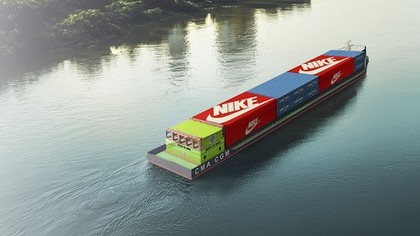CMA CGM has announced its entry into the growing market of battery-powered micro-feeders with a new collaboration in Vietnam, aimed at transporting goods for Nike. The innovative project involves an ‘e-barge’ with a capacity of approximately 100 TEU, designed to transport sportswear from Nike’s 31 factories located in and around Ho Chi Minh City to the Gemalink terminal at Cai Mep Port via the Dong Nai River.
This electric barge will recharge its batteries using solar power generated at Cai Mep Port, where the buildings have rooftop solar panels. Solar technology adoption, however, remains limited in many other parts of the world.
The e-barge represents the latest step in the maritime industry’s exploration of small electric container vessels and barges. Notable precedents include the Yara Birkeland, launched in 2019, and Cosco’s N997, a 700-TEU Yangtze River vessel with a 50 MWh battery capacity launched last year. This year, Ningbo Ocean Shipping ordered two 740-TEU feeders powered by 19 MWh battery packs each.
A recent report by the Maersk Mc-Kinney Møller Center for Zero Carbon Shipping has highlighted the potential for battery-electric operation in vessels within the >1,100 TEU size range, which has historically been underutilized due to economic challenges. The study suggests that improved energy efficiency and optimized battery-electric propulsion systems could make these vessels more viable. Such systems offer roughly double the operational range of traditional engines and fuel tanks, making them a promising option for short-distance feeder operations.
The study further emphasized that ports adopting shore power and battery-electric systems could better utilize renewable energy compared to alternative electro-fuels like methanol and ammonia. This approach is deemed particularly suitable for short voyages requiring energy capacities up to 250 MWh.
The introduction of CMA CGM’s e-barge reflects the maritime industry’s broader shift toward sustainable solutions, showcasing the potential for innovative technologies to revolutionize logistics and reduce environmental impact.












